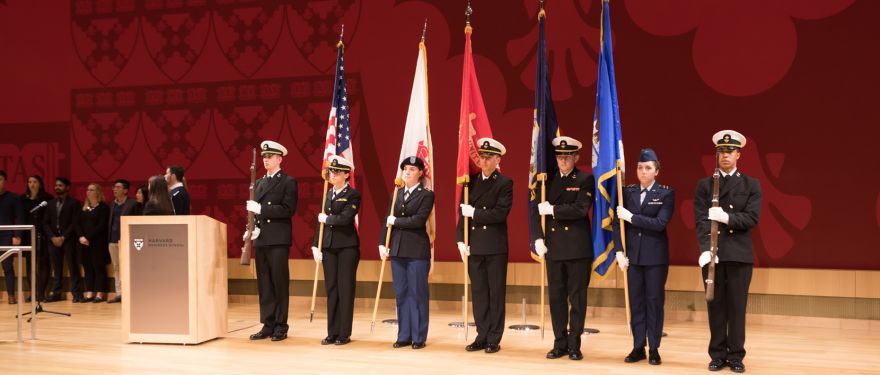I have some good news and some bad news.
First, the bad news: Graduate School might not be “free” after all. I know, this smacks in the face of everything I was told when I was a Cadet and Junior Officer. Unless you are participating in GrADSO or PB-GSIP for the Army, other cool programs our sister services have, or fulfilling a pre-assignment requirement to teach at one of the Service Academies or to be a strategist, my advice is to brace yourself for some loans. This is not unique to Harvard, though. Remember that VA allowable tuition and fees are a subset of the tuition and fees actually charged.
Now the good news: After going through the full-time MBA program at HBS (even with the Coronavirus disruption and finishing my last quarter on-line), I don’t think I could put a price on the education and experiences I received.
Here are some numbers to chew on.
| 2020-2021 | Single | Married | Married with One Child | Married with Two Children |
|---|---|---|---|---|
| Tuition | $73,440 |
$73,440 |
$73,440 |
$73,440 |
| HUHS Student Health Fee (SHF) & Plan | $5,128 |
$5,128 |
$5,128 |
$5,128 |
| Course & Program Materials Fee | $2,550 |
$2,550 |
$2,550 |
$2,550 |
| Dependent Health Care, Rent, Living Expenses* | $30,700 |
$51,058 |
$66,672 |
$73,840 |
| Total | $111,818 |
$132,176 |
$147,790 |
$154,958 |
*For a full breakdown of where these numbers came from please visit the HBS Financial Aid website.
For simplicity, and because I went through HBS as a single person with the full Post-9/11GI Bill, the numbers going forward will use the Single Student estimates. A quick plug for those with families: HBS is a diverse place with all sorts of families who live together at/near HBS and apart for portions of the year. More information is available in our Student Life Section.
The Post-9/11 GI Bill (Ch.33) is capped at $25,162.14 per academic year. HBS is a Yellow Ribbon Program (YRP) School that does not have a limit on how many YRP participants are enrolled. If you have earned 100% of the Post-9/11 GI Bill, HBS contributes $20,000/year in non-need-based aid, which the VA matches for a total of $40,000/year. Add in the estimated MHA (monthly allowance for housing) – I used the GI Bill® Comparison Tool at www.VA.gov – of $3,024/month for roughly 9 months (just so you know, it is pro-rated to the day) for $27,216. Toss in a book stipend of $1,000/year. Our starting point is $93,378.14 in aid per year. Sweet!
If you didn’t earn the full Post-9/11 GI Bill, HBS doesn’t forget about you for need-based aid. Historically, those who earned 40% of the Post-9/11 GI Bill received an average of $75,000 over two years while those with 60% received an average of $48,000 over two years. The data around the other percentages varied greatly and were impacted by family situation. It doesn’t hurt to apply for financial aid and see what your outcome is.
Pro-tip: Summer internships between your 1st and 2nd year are paid! Many internships such as those in consulting are paid very generously. I probably should have put mine towards tuition, but I decided to travel over winter break and chose to put much of it toward travel.
Now for some tough love. Harvard’s Financial Aid model is need-based and relies on a shared investment with each student. The long story short is no student is here with 100% of the cost of attendance covered by a HBS Scholarship.
For me, I decided if I needed to take out $30,000-$50,000 in student loans over two years, it would be worth the investment. The Career and Professional Development Office reports the average starting salary post-HBS by industry. On the low side, Non-profit’s median salary is $95,000 while Consulting’s median salary is $145,000. Both numbers were higher than my O-3 over eight years pay rate even with “flight pay”, so I was confident I could both pay back my loans and enjoy an upgrade to my lifestyle.
Did I accept my offer to HBS with the knowledge that I was going to be self-financing a portion? Yes. Was I thrilled about self-financing a portion? No, especially since I declined acceptance to another great program that offered, essentially, a “full ride.” Why HBS then? Ultimately, I considered my personal financial situation with my goals. I applied to scholarships and sought additional assistance through VR&E (Ch.31). I decided HBS was the place I could maximize my transition into civilian life, learn skills I needed to be successful, and make some life-long friends along the way. I had no idea what I was in for and would not be where I am today without those two years at HBS. I wish you the very best!

